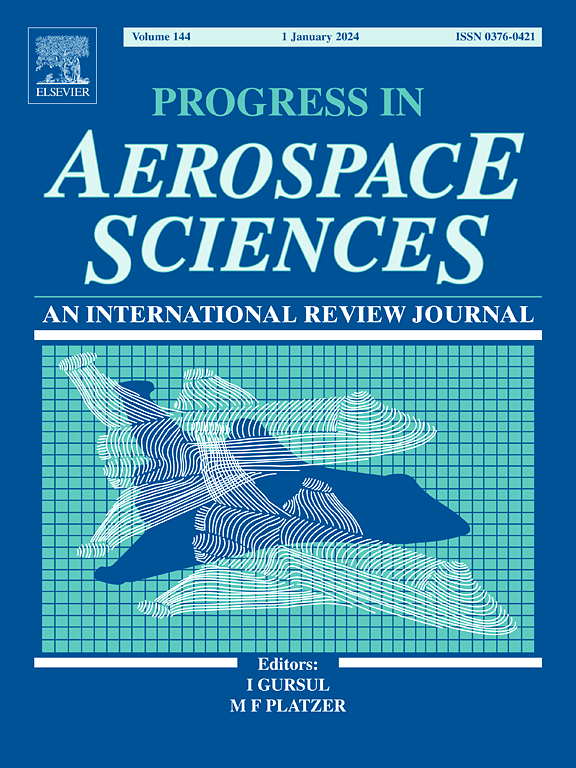Progress in inverse finite element method for aerospace structural health monitoring applications
IF 16.2
1区 工程技术
Q1 ENGINEERING, AEROSPACE
引用次数: 0
Abstract
This review critically examines recent progress in the inverse finite element method (iFEM) for aerospace structural health monitoring (SHM), consolidating developments and emerging interdisciplinary applications. It offers novel insights into the latest inverse formulations, supported by benchmark numerical comparisons that aid in selecting suitable formulations for efficient airframe prognosis. Recognizing the importance of full-field sensing in aerospace monitoring systems, this review presents a unified analysis of numerical and experimental validations while accounting for uncertainties inherent in real-world implementations. In addition to the shape-sensing applications of iFEM, this review further examines a comprehensive damage assessment framework, including methods for identifying damage topologies such as material discontinuities and degradation resulting from operational or environmental conditions. Interdisciplinary methodologies integrating iFEM with advanced modeling and data-driven frameworks are reviewed for their efficacy in real-time defect characterization, offering insights into their broader potential for aerospace digital twin (DT) implementations. In addition, this study identifies current limitations in iFEM and outlines future directions to enhance its robustness, scalability, and adaptability for the rapidly evolving aerospace sector. By reviewing emerging trends in iFEM, this article serves as a foundational reference for researchers and practitioners aiming to design efficient and cost-effective aerospace SHM solutions.
逆有限元法在航天结构健康监测中的应用进展
本文综述了用于航空航天结构健康监测(SHM)的逆有限元方法(iFEM)的最新进展,巩固了发展和新兴的跨学科应用。它提供了新的见解,最新的逆配方,支持基准数值比较,有助于选择合适的配方,有效的机体预测。认识到全场传感在航空航天监测系统中的重要性,本文综述了对数值和实验验证的统一分析,同时考虑了现实世界实现中固有的不确定性。除了ifm的形状感应应用之外,本审查还进一步审查了一个全面的损害评估框架,包括确定损坏拓扑结构的方法,例如由操作或环境条件引起的材料不连续性和退化。将iFEM与高级建模和数据驱动框架相结合的跨学科方法在实时缺陷表征中的有效性进行了审查,并提供了对其在航空航天数字孪生(DT)实现中的更广泛潜力的见解。此外,本研究确定了妇发基金目前的局限性,并概述了今后的方向,以加强其坚固性、可扩展性和适应迅速发展的航空航天部门。本文通过回顾国际空间空间有限元的新兴趋势,为旨在设计高效、经济的航空航天空间空间空间模型解决方案的研究人员和实践者提供基础参考。
本文章由计算机程序翻译,如有差异,请以英文原文为准。
求助全文
约1分钟内获得全文
求助全文
来源期刊

Progress in Aerospace Sciences
工程技术-工程:宇航
CiteScore
20.20
自引率
3.10%
发文量
41
审稿时长
5 months
期刊介绍:
"Progress in Aerospace Sciences" is a prestigious international review journal focusing on research in aerospace sciences and its applications in research organizations, industry, and universities. The journal aims to appeal to a wide range of readers and provide valuable information.
The primary content of the journal consists of specially commissioned review articles. These articles serve to collate the latest advancements in the expansive field of aerospace sciences. Unlike other journals, there are no restrictions on the length of papers. Authors are encouraged to furnish specialist readers with a clear and concise summary of recent work, while also providing enough detail for general aerospace readers to stay updated on developments in fields beyond their own expertise.
 求助内容:
求助内容: 应助结果提醒方式:
应助结果提醒方式:


